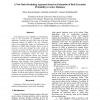Free Online Productivity Tools
i2Speak
i2Symbol
i2OCR
iTex2Img
iWeb2Print
iWeb2Shot
i2Type
iPdf2Split
iPdf2Merge
i2Bopomofo
i2Arabic
i2Style
i2Image
i2PDF
iLatex2Rtf
Sci2ools
JCIT
2008
2008
A New Rule Scheduling Approach based on Estimation of Rule Execution Probability in Active Database
Active database systems (ADBS) can, automatically, react to the occurrence of predefined events by definition a collection of active rules. One of the most important modules of ADBS is the rule scheduler, which has considerable impact on performance and efficiency of ADBS. Rule scheduler selects a rule to execute in each time through the rules, which are ready for execution. We have already evaluated and compared the existing rule scheduling approaches in a laboratorial environment based on three tier architecture. Five evaluation criteria were, formally, recognized and defined for evaluation and comparison of rule scheduling approaches including: Average Response Time, Response Time Standard Deviation, Throughput, Time Overhead per Transaction and CPU Utilization. At last, we introduced the most effective approach. In this paper, we propose a new approach to improve the rule scheduling based on improvement of Rule Execution Probability Estimation. Then, we compare it with the most ef...
| Added | 13 Dec 2010 |
| Updated | 13 Dec 2010 |
| Type | Journal |
| Year | 2008 |
| Where | JCIT |
| Authors | Abbas Rasoolzadegan, Rohollah Alesheykh, Ahmad Abdollahzadeh |
Comments (0)

